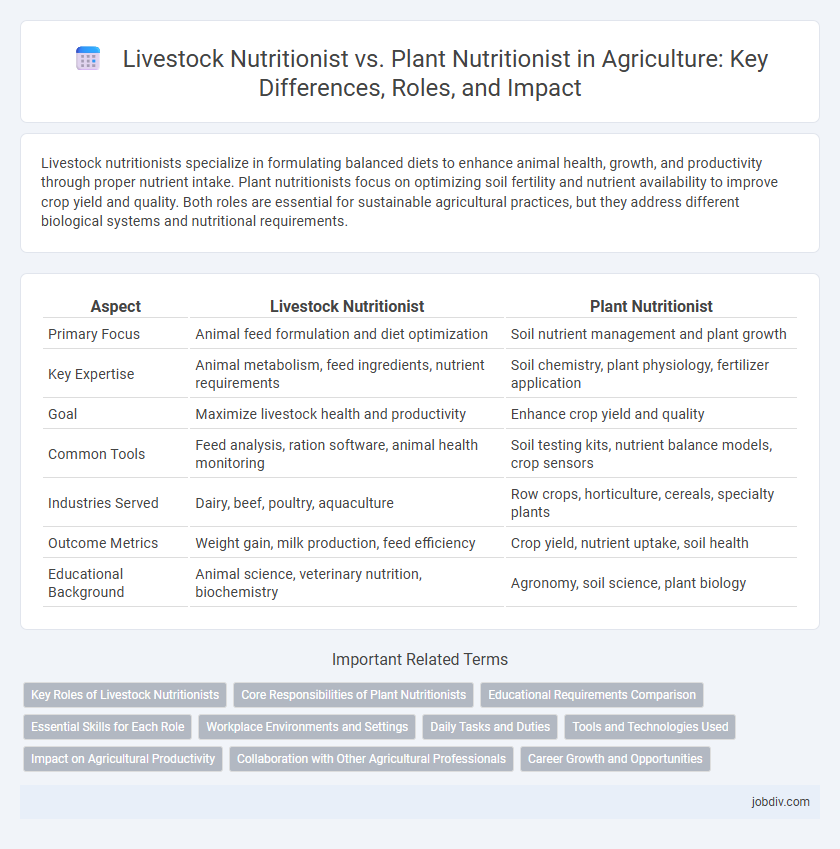Livestock nutritionists specialize in formulating balanced diets to enhance animal health, growth, and productivity through proper nutrient intake. Plant nutritionists focus on optimizing soil fertility and nutrient availability to improve crop yield and quality. Both roles are essential for sustainable agricultural practices, but they address different biological systems and nutritional requirements.
Table of Comparison
| Aspect | Livestock Nutritionist | Plant Nutritionist |
|---|---|---|
| Primary Focus | Animal feed formulation and diet optimization | Soil nutrient management and plant growth |
| Key Expertise | Animal metabolism, feed ingredients, nutrient requirements | Soil chemistry, plant physiology, fertilizer application |
| Goal | Maximize livestock health and productivity | Enhance crop yield and quality |
| Common Tools | Feed analysis, ration software, animal health monitoring | Soil testing kits, nutrient balance models, crop sensors |
| Industries Served | Dairy, beef, poultry, aquaculture | Row crops, horticulture, cereals, specialty plants |
| Outcome Metrics | Weight gain, milk production, feed efficiency | Crop yield, nutrient uptake, soil health |
| Educational Background | Animal science, veterinary nutrition, biochemistry | Agronomy, soil science, plant biology |
Key Roles of Livestock Nutritionists
Livestock nutritionists specialize in formulating balanced diets tailored to optimize animal health, growth, and productivity by analyzing nutrient requirements and feed composition. They conduct research on feed efficiency, manage dietary supplements, and monitor animal performance to prevent nutritional disorders and enhance livestock profitability. Their expertise supports sustainable farming practices by improving feed utilization and reducing environmental impacts from animal waste.
Core Responsibilities of Plant Nutritionists
Plant nutritionists specialize in optimizing soil health and managing nutrient availability to enhance crop growth and productivity. They conduct soil and plant tissue analyses, recommend fertilization strategies, and monitor nutrient uptake to prevent deficiencies and toxicities. Their core responsibility includes formulating balanced fertilization plans that improve crop yield and quality while minimizing environmental impact.
Educational Requirements Comparison
Livestock nutritionists typically require a bachelor's degree in animal science, agriculture, or a related field, often complemented by advanced studies in animal nutrition and physiology. Plant nutritionists usually hold a degree in agronomy, plant science, or soil science, with specialized knowledge in plant physiology, soil chemistry, and nutrient management. Both careers benefit from certifications and practical experience, but livestock nutritionists focus on animal dietary needs while plant nutritionists concentrate on optimizing soil and plant health for crop production.
Essential Skills for Each Role
Livestock nutritionists require expertise in animal physiology, feed formulation, and nutrient metabolism to optimize animal health and productivity, while plant nutritionists focus on soil science, nutrient uptake, and crop physiology to enhance plant growth and yield. Both roles demand strong analytical skills and proficiency in data interpretation to develop tailored nutrition strategies; however, livestock nutritionists prioritize understanding digestive systems, whereas plant nutritionists emphasize soil fertility and environmental factors. Effective communication skills are essential for collaboration with farmers and agronomists in both fields to implement nutrition plans successfully.
Workplace Environments and Settings
Livestock nutritionists typically work in farm settings, feed mills, or agricultural research facilities where they formulate diets to optimize animal health and productivity. Plant nutritionists are commonly found in greenhouses, crop fields, agricultural laboratories, and agribusiness companies, focusing on soil analysis and nutrient management for crops. Both roles demand collaboration with farmers and agricultural scientists but differ significantly in their environmental contexts and specific nutritional challenges.
Daily Tasks and Duties
Livestock nutritionists formulate balanced diets to optimize animal health, growth, and production by evaluating feed ingredients and monitoring nutrient intake. Plant nutritionists analyze soil conditions and recommend fertilizer regimes to enhance crop yield and nutrient uptake efficiency. Both professionals use scientific data to improve productivity but focus on different biological systems, with livestock nutritionists addressing animal metabolism and plant nutritionists targeting soil-plant interactions.
Tools and Technologies Used
Livestock nutritionists utilize precision feeding software, near-infrared spectroscopy (NIRS), and digital rumen monitors to optimize animal diets and monitor health. Plant nutritionists employ soil sensors, drone-based multispectral imaging, and GPS-guided variable-rate fertilizer applications to enhance nutrient management in crops. Both professionals leverage data analytics and IoT technologies to improve productivity and sustainability in agricultural systems.
Impact on Agricultural Productivity
Livestock nutritionists enhance agricultural productivity by optimizing animal diets to improve growth rates, reproductive performance, and overall health, leading to higher meat, milk, and egg yields. Plant nutritionists focus on soil fertility and nutrient management to boost crop yields, quality, and resistance to pests and diseases, directly influencing food production efficiency. Both specialists contribute to sustainable agriculture by maximizing resource use efficiency and minimizing environmental impact.
Collaboration with Other Agricultural Professionals
Livestock nutritionists collaborate with veterinarians, feed manufacturers, and farm managers to optimize animal health and productivity through tailored feeding programs. Plant nutritionists work closely with soil scientists, agronomists, and crop consultants to enhance nutrient management and improve crop yields. Both professionals integrate their expertise with other agricultural specialists to ensure sustainable and efficient farm systems.
Career Growth and Opportunities
Livestock nutritionists specialize in formulating balanced diets to enhance animal health and productivity, with career opportunities in dairy farms, feed companies, and veterinary services showing steady growth due to rising demand for sustainable livestock production. Plant nutritionists focus on optimizing soil health and nutrient management to improve crop yields, with expanding roles in agribusiness, research institutions, and precision agriculture fueled by advancements in sustainable farming technologies. Both fields offer promising career trajectories, but plant nutritionists often experience broader opportunities driven by global emphasis on food security and environmental sustainability.
Livestock Nutritionist vs Plant Nutritionist Infographic

 jobdiv.com
jobdiv.com